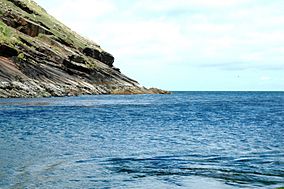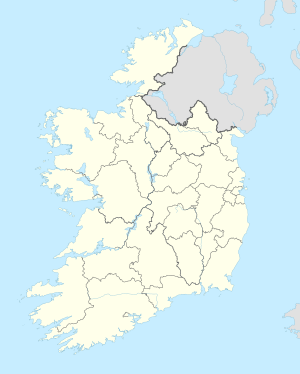Erris Head facts for kids
Quick facts for kids Erris Head |
|
|---|---|
| Ceann Iorrais | |
|
IUCN Category IV (Habitat/Species Management Area)
|
|

Erris Head
|
|
| Location | County Mayo, Ireland |
| Governing body | National Parks and Wildlife Service (Ireland) |
Erris Head (in Irish, Ceann Iorrais) is a special piece of land that sticks out into the Atlantic Ocean. It's like a big nose on the map! You can find it at the very top of the Mullet Peninsula in County Mayo, Ireland.
This place is important for sailors and weather experts. It's also a beautiful spot with amazing views of the ocean and tall, rocky cliffs. There are no roads to Erris Head, so you have to walk across fields to get there.
Contents
Protecting Nature at Erris Head
Erris Head is a very important natural area. It has been named a Special Area of Conservation (SAC) by the European Union. This means it's a protected place where special plants and animals can live safely.
Land and Rocks at Erris Head
The land at Erris Head is made of old, hard rocks. These include quartzite, gneiss, and Silurian schists and slates. The sea cliffs here are very exposed to the weather. They get a lot of rain and strong winds. The cliffs are not super tall, reaching about 90 meters (295 feet) at their highest point.
Plants and Flowers of Erris Head
Even with tough conditions, many plants grow on the cliffs. You might see plants like roseroot and rock sea-spurrey.
Inland from the cliffs, there's a special kind of dry grassland called alpine heath. Here, you can find plants like juniper, bearberry, crowberry, and different types of heather.
Some parts of Erris Head are wet and marshy. In these areas, you might discover blunt-flowered rush, three kinds of sundew (which are carnivorous plants!), and the rare marsh heleborine orchid.
Animals and Wildlife at Erris Head
The cliffs at Erris Head are home to many seabirds. You'll often see fulmars and great black-backed gulls nesting there. Peregrine falcons, which are very fast birds, and choughs also make their homes on the cliffs.
In winter, barnacle geese come to feed on the grassy areas above the cliffs. On the land, you might spot Irish hares and common frogs. If you look down at the bottom of the cliffs, you can often see grey seals swimming or resting.
Erris Head Marine Reserve
The sea area near Erris Head is also protected. This includes the water up to 200 meters (656 feet) from the base of the cliffs. This marine reserve helps keep the cliff-nesting seabirds safe and protects their feeding grounds.
See also
In Spanish: Cabo de Erris para niños
 | Ernest Everett Just |
 | Mary Jackson |
 | Emmett Chappelle |
 | Marie Maynard Daly |


